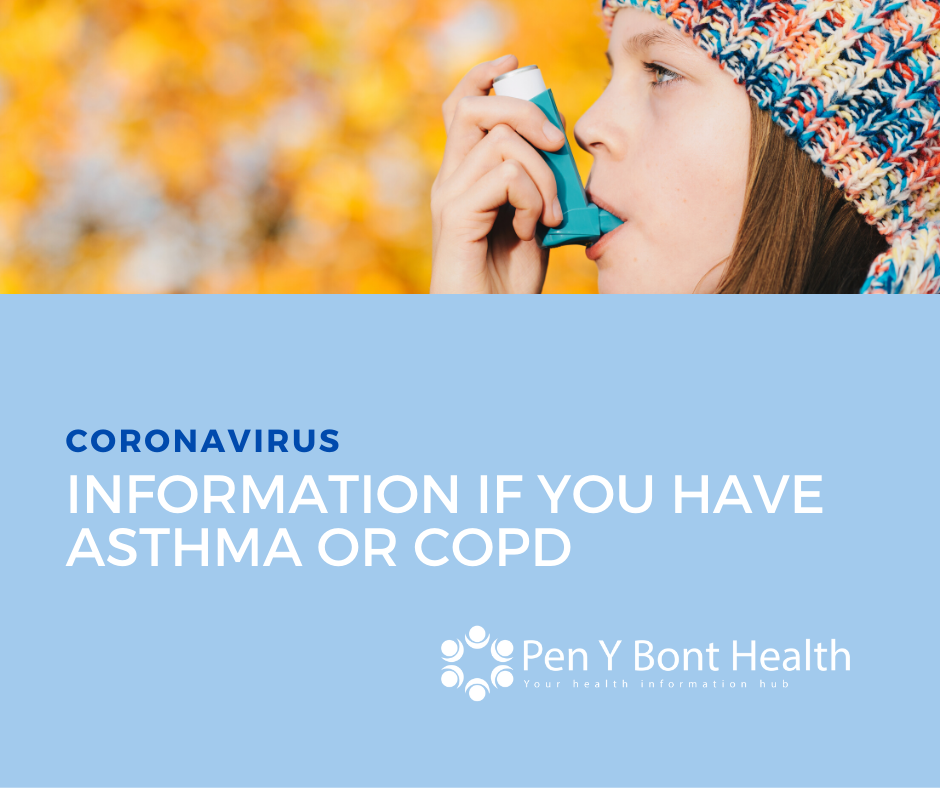Home » Asthma
Coronavirus – Information if you have asthma or COPD
You should continue your treatment as normal and ensure you are taking your inhalers regularly as prescribed. If you haven’t been using your current prescribed inhalers you should restart them. You do not need to increase the use of your inhalers as a precaution or take extra blue inhaler just in case.
Instead follow the self-management advice and any action or management plans previously given by your nurse or doctor.
Unless this is already part of your management plan you do not need to be prescribed a rescue pack to take now as a precaution or keep at home just in case.
If you already have a rescue pack as part of your ongoing management you should only take this as previously advised by your nurse or doctor i.e. if you have worsening symptoms of your asthma or COPD. Due to the current Coronavirus situation though we advise you to contact your GP prior to starting any rescue pack for review.
Further information on managing your asthma can be found at www.asthma.org.uk
Further information on managing your COPD can be found at www.BLF.org.uk
Further information on Coronavirus can be found at phw.nhs.wales

Asthma
Asthma is a common lung condition caused when inflammation (swelling) of the airways occurs resulting in narrowing of the breathing tubes.
There is no cure for asthma however with simple treatment you can become symptom free. You can be diagnosed with asthma at any age and it is quite common to grow out of the condition. Asthma is associated with eczema and hay fever which are known as atopic conditions, which refers to the genetic tendency to develop allergic diseases (NHS Choices, 2016).
Normally Asthma is triggered by certain factors like allergens (dust, animal fur, pollen, certain foods), irritants (smoke, fumes, gases, cold air), exercise, hormonal changes, some medications and Viral or bacterial chest infections.
Video support
Symptoms of Asthma
- Wheeze
- Chest tightness
- Cough
- Breathlessness
Each individual experiences variations of the above symptoms. Asthma can vary from very mild to severe depending on exposure to triggers. For some people these symptoms may be persistent or be intermittent. If you are experiencing one or more of these symptoms it is important to get assessed by a Nurse or Doctor.
A thorough history and possible breathing tests will need to be performed before a diagnosis of asthma is made. Please be aware that other conditions can cause the above symptoms so an alternative diagnosis might be made.
Treatment of Asthma
Once an Asthma diagnosis has been made, the healthcare professional will decide on treatment depending on the symptoms and severity. The following should be performed (Asthma UK, 2016):
- Identifying the main trigger (cause of symptoms-so avoidance of this) these should be performed
- Reliever inhaler – these inhalers are short acting inhalers which should be used when you are experiencing your asthma symptoms
- Preventer inhaler – these inhalers are long acting inhalers and need to be taken regularly (normally twice a day) to help improve the airway inflammation and preventing the need to use the short acting inhaler regularly.
Asthma in Adults
Spirometry or peak flow diary is used to diagnose asthma in adults. However, if these results are normal, then a trial of inhaled treatment may be performed and if there is an improvement in symptoms the clinician may diagnose you with asthma. Similar to children if asthma is unlikely further investigations may be performed to rule out other conditions.
Adults are also recommended to use spacers with certain inhaler devices to improve inhaler technique.
It is important not to smoke when you have asthma as it can increase your risk of developing lung disease. If you need help with stopping smoking please speak to the practice about receiving smoking cessation support. stop smoking wales
Read more here on Asthma in children.
 Word from our GP
Word from our GP
A history of other atopic conditions such as eczema or hay fever increases the probability of asthma.
A family history of atopy is the most common risk factor for asthma in children.
Read our coffee break interview with Dr Geraghty here.
Dr Neil Geraghty, Ashfield Surgery
References:
Asthma UK (2016) Diagnosing Asthma in Adults.
